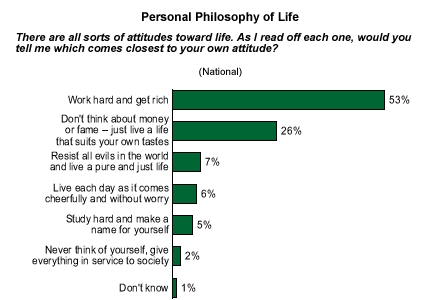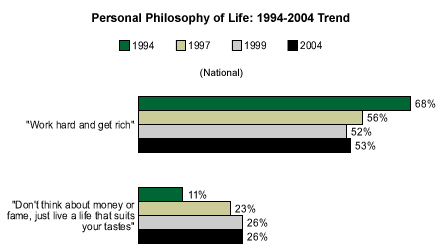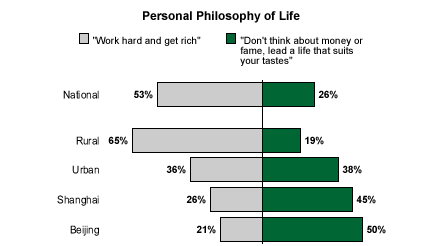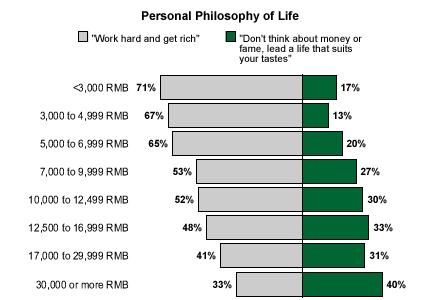Cranes lit by searchlights at 3:00 a.m. as construction projects proceed around the clock. Near double-digit annual economic growth for the past two decades, with exports increasing 20% per year in the same period. A $1.3 trillion economy that now trails only the United States, Japan, and Germany as a manufacturing power.
China's staggering economic growth has been fueled not only by the attempt to replace a socialist "command economy" with one built along market lines, but also by an extraordinary commitment to hard work among the people of the Middle Kingdom. Harvard theologian Michael Novak has argued that certain Confucian values are similar to those analyzed by Max Weber in The Protestant Ethic and the Spirit of Capitalism (1904) -- such values help explain the extraordinary performance of China's economy following economic liberalization.
What do the Chinese themselves say about their personal values and philosophies? Since 1994, Gallup has asked the people of China which of these six statements comes closest to describing their basic attitude toward life:
- Work hard and get rich.
- Study hard and make a name for yourself.
- Don't think about money or fame, just live a life that
suits your own tastes.
- Live each day as it comes, cheerfully and without
worrying.
- Resist all evils in the world and live a pure and just
life.
- Never think of yourself, give everything in service to society.
Not surprisingly, the credo "work hard and get rich" is by far the most popular choice, selected by 53% of respondents. About one in four Chinese (26%) opt for "don't think about money or fame, just lead a life that suits your own tastes," while less than a tenth of Chinese identify with all the other responses. Perhaps most telling: Only 2% of Chinese choose the collectivist exhortation to "never think of yourself, give everything in service to society."
In short, it would appear that the country's commitment to material self-betterment through hard work is firmly rooted and unchallenged.

Importance of Self-Expression and Leisure Has Increased
However, as material conditions have improved for much of the country's population in recent years, so has the level of importance attached to non-material self-expression. Since Gallup first started asking this question 10 years ago, the percentage of respondents answering with "work hard and get rich" has declined, from 68% in 1994 to 53% today. Conversely, the percentage describing their personal philosophy as "don't think about money or fame, just live a life that suits your own tastes" has more than doubled, from 11% in 1994 to 26% this year. Although this shift appears to have halted for the time being -- the relative proportions currently advocating these two philosophies are statistically unchanged from Gallup's 1999 survey -- the change across the past decade as a whole has been significant.

There is also a significant division between rich and poor on the issue of personal philosophy, which strongly suggests that the more one's basic material needs are secured, the more emphasis one is likely to place on the importance of "living a life that suits your own tastes."
Among those at the top end of the country's income distribution -- earning annual household incomes greater than 30,000 RMB ($3,625) -- only a third say "work hard and get rich" is their personal credo. Even more dramatic is the finding that among all residents of the booming cities of Beijing and Shanghai, no more than a quarter say their primary objective in life is to work hard and get rich, while nearly half (50% and 45%, respectively) aim to lead a life that suits their own tastes.
Conversely, among those in China with annual household incomes below 3,000 RMB ($362), 71% say "work hard and get rich" best describes their view toward life. But it is worth noting that being "rich" is a relative concept. Among the very poorest Chinese, "work hard and get rich" may well equate to "work hard if you wish to feed, clothe, house, and educate your family properly."
Similarly, in the far less affluent rural sector, the "work hard and get rich" response overwhelms all other options, with 65% of rural respondents selecting this phrase and only 19% choosing "don't think about money or fame, just live a life that suits your own tastes."
Bottom Line
With greater levels of affluence, the importance of the capitalist work ethic begins to erode, and the end becomes self-expression rather than simply the pursuit of money. Given that affluence is increasing dramatically -- particularly in urban China -- this trend will no doubt take hold more firmly in the China of the future.



